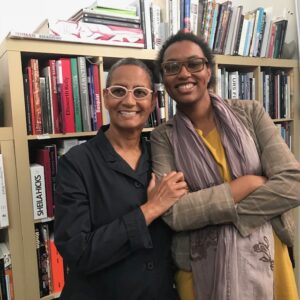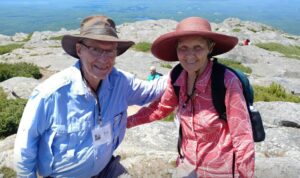Lance Reddick Scholarship in the Keene Sentinel
The Keene Sentinel interviewed Executive Director Seth Brenzel about the newly announced Lance Reddick Scholarship.
“It’s expensive to run any kind of music education program,” Brenzel said. “We’ve always been committed to providing financial aid, and I’m just thrilled we’re going to be able to grow that number quite significantly and create even more access opportunities.”
Read the full article: Walden's Young Musician Program receives $450,000 to offer full scholarships
Lance Reddick Scholarship in the Monadnock Ledger-Transcript
The Monadnock Ledger-Transcript covered the Lance Reddick Scholarship in a January 24, 2024 article.
"Lance was a wonderful supporter of Walden, and we are excited to see how Walden can be a springboard to future music creators who attend the Young Musicians Program as Lance Reddick Scholars,” stated Seth Brenzel, executive director of The Walden School. “We are so grateful to the generous donor who made this transformative gift to honor Lance's legacy."
Read the full article: Walden School announces Reddick Scholarship
Announcing the Lance Reddick Scholarship
FOR IMMEDIATE RELEASE
Media Contact:
Marisa Giller
314.630.4123, marisagiller@gmail.com
THE WALDEN SCHOOL ANNOUNCES LANCE REDDICK SCHOLARSHIP
Anonymous Donor Steps Forward to Honor Legacy of Esteemed Walden Alumnus and Actor, Lance Reddick, Creates Full Scholarship Program for Young Musicians
DUBLIN, N.H., (January 18, 2024) – Today, The Walden School, the celebrated summer music school and camp, announced it received a $450,000 anonymous donation in memory of esteemed alumnus and actor, Lance Reddick, who passed away suddenly in the spring of 2023.
The donation will fund 10 full scholarships per year for its 2024-2026 Young Musicians Program, enabling deserving young musicians the opportunity to experience Walden’s summer five-week program free of charge. Five of the 10 scholarships will be awarded specifically to students from the Baltimore area in honor of Mr. Reddick’s hometown and the birthplace of The Walden School.
Mr. Reddick attended The Walden School from 1976-1980, returning in 1983 as a Walden faculty member. While he was a lifelong creator and student of music, he was most well known for his television and film work, particularly for his role as Cedric Daniels in “The Wire.”
Walden’s Young Musicians Program is a five-week summer camp for students ages 9 to 18 that offers musical training in a supportive musical community. Students attend classes in composition, musicianship, music history, choral singing, computer musicianship, jazz, and more. Dances, swim trips, mountain hikes, and open mic nights balance out this rigorous musical training.
“Lance would be so honored by these scholarships being named for him, and this project would really touch his heart,” said Stephanie Reddick, Lance’s wife.
Mr. Reddick openly shared the importance of financial assistance in allowing him to participate in creative opportunities like Walden’s program that shaped the arc of his life. The scholarship in his name will provide each student with full tuition, room, and board, along with a travel stipend.
"Lance was a wonderful supporter of Walden, and we are excited to see how Walden can be a springboard to future music creators who attend the Young Musicians Program as Lance Reddick Scholars,” said Seth Brenzel, Executive Director of The Walden School. “We are so grateful to the generous donor who made this transformative gift to honor Lance's legacy."
Applications are due Friday, March 1. To apply, visit waldenschool.org/apply/. To learn more about the Lance Reddick Scholarship, visit waldenschool.org/lance-reddick-scholarship/.
About The Walden School
The Walden School inspires artistic expression and personal growth through experiential music programs. Founded in 1972, the acclaimed summer music school and festival offers programs that emphasize creativity through musicianship, improvisation, and composition. Programs include the Young Musicians Program for youth ages 9-18, and the Creative Musicians Retreat for adults. The Summer Concert Series showcases free, public performances by renowned artists and ensembles that work closely with students and perform their original music. To learn more visit www.waldenschool.org.
In the Spotlight: Tuck Crocker and Walden’s fabulous new Steinway
IN THE SPOTLIGHT
Tuck Crocker and Walden’s fabulous new Steinway
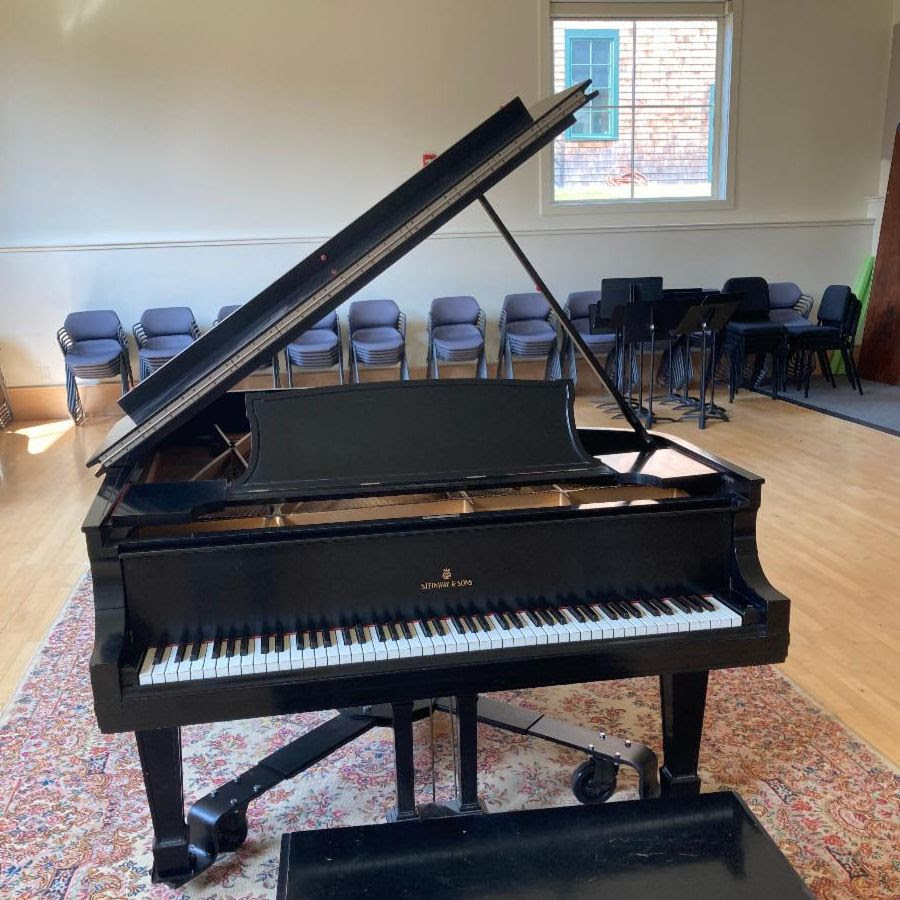
Augustus T. Crocker, Jr. (known as Tuck), a lifelong Dublin resident, has donated his family’s beautiful Steinway piano to The Walden School. The instrument is a Steinway A3 from about 1915 that has been incredibly well cared for by the Crocker family for generations. Tuck made this special gift in loving memory of Lyneham and Mary Crocker and Augustus Thorndike Crocker, M.D. This instrument will greatly enhance Walden’s Concert Series, presented free of charge every summer in the Dublin School’s Louise Shonk Kelly Recital. Dublin School has agreed to store the instrument and will use it for special occasions during the year.
The piano arrived just before the start of our 50th-Anniversary Walden/Junior Conservatory Camp (JCC) Alumni Reunion. Mackenzie Melemed, a Walden alumnus, gave a breathtaking solo recital, and the piano was also used in our Alumni Composers Forum. While these events were enjoyed by Walden alumni, a public inaugural event is being planned for next summer—stay tuned!
Below, Tuck Crocker shares more about the piano, its history, and his hopes for the instrument’s future at Walden and Dublin.
Above: Mackenzie Melemed performing on the Steinway during this summer’s Walden/JCC Alumni Reunion
How old is the piano, and how did it first come into your family?
The piano was made by Steinway in New York in 1914 or 1915. It was sold as one of a matched pair by Steinert of Boston to my great-grandparents, Dr. and Mrs. Augustus Thorndike, as an engagement gift to my grandparents, Lyneham and Mary Thorndike Crocker, in 1915. It has stayed in the family since it was purchased.
Who in your family played it? What is its significance to you?
The piano was played by my grandparents, my father, Augustus Thorndike Crocker, MD, and his siblings, Eunice (Wold), Evelyn (Querfurth), and Marianne, their uncle, Amory Thorndike, my uncle, Peter M. Hewitt, my brothers, my cousins, and myself, along with people like Louise Shonk Kelly and William S. Palmer, MD.
The piano has always been special to me as a family heirloom and as something that connected my father’s family through music—including three professional musicians (an aunt and two cousins). It’s also special to me because of so many childhood memories: my father playing in the evening when we were going to bed, my father playing four-handed piano with his sisters, long laughing lessons with my father and my uncle Peter Hewitt, family recitals, talented house guests like Louise Shonk Kelly playing with my father, and teaching myself to arrange music and to read charts.
How did your relationship with Walden begin, and why did you think of Walden for this special gift?
My relationship with Walden began when I met Seth after one of the Walden performances at Emmanuel Church in Dublin. My wife and I have supported The Walden School and enjoyed various performances. Due to illness, I’m no longer able to play the piano or to arrange music, and nobody in my family is able to “take on” the instrument. I’m grateful to The Walden School and Dublin School for being able to make use of this special instrument.
What are your hopes for the piano’s future at Walden and Dublin School?
I hope that it makes chamber music at Walden and Dublin School sound great, and that it is useful as a training and learning instrument for serious musicians. My family and I continue to hope that we can enjoy hearing the lovely sound of this instrument in its new home played by talented people who enjoy it!
 MACKENZIE MELEMED ON WALDEN’S NEW STEINWAY PIANO
MACKENZIE MELEMED ON WALDEN’S NEW STEINWAY PIANO
“It was a pleasure to inaugurate the arrival of a new Steinway to the Walden School campus and into the Walden family. This sensitive and dynamic instrument will not only complement the existing Yamaha and allow for two-piano and larger ensemble collaborations, but it will also provide students with a fantastic opportunity to perform on a world-class instrument. Steinway is truly the gold standard. As a Steinway artist myself, I am thrilled to see that one has been generously donated to Walden and installed in Dublin!”
In the Spotlight: Rita Lewis and Ofurhe Igbinedion
In the Spotlight
Rita Lewis and Ofurhe Igbinedion
Ofurhe Igbinedion attended the Young Musicians Program (YMP) from 1999 through 2001. She recently completed a PhD in Geography at the University of California at Davis and works as a transportation planner for the Oakland Department of Transportation.
Her mother, Rita Lewis, has worked as a Registered Nurse for 30 years. She lives in Emeryville, California.
Veda Igbinedion, Ofurhe’s brother and Rita’s son, also attended YMP for one summer. He works as an attorney in the U.S. Army JAG Corps.
Rita and Ofurhe are longtime donors to Walden, and they both have set up recurring gifts through Walden’s online donation platform.
How did you and your family first get involved with Walden?
Ofurhe: My first year at the Young Musicians Program (YMP) was 1999. My brother, Veda, had gone the year before me. I remember being impressed when Veda came home from Walden with a piece of music that he wrote. I just thought it was like the coolest thing. I didn’t realize that was something you could do, you know?
I did piano and ballet, and I had been to Interlochen in my fourth-grade summer. And then I went to Walden the summer after that. I went to Walden for three summers. In high school I ended up going to boarding school in Vermont, not far from the Dublin School. So I feel like Walden kind of prepared me for boarding school.
Our summers were always filled with academic camps. Coming from a family with a single mom who was working, we had to do something in the summers. And I’m a nerd. I love school, but over the summers I got to choose which subjects I wanted to spend more time with. And I can’t spend enough time playing music.
Rita: I first learned about Walden by seeing a poster at the former Tupper & Reed music store in Berkeley. When my son, Veda, went, he was the youngest kid there at age ten. He had a wonderful time and came home with his first composition. His first week at Walden he went to the music store, and the first CD he bought was of Thelonious Monk in Paris, and I thought: I have the coolest kid! That’s what first established our family’s relationship with Walden.
I also want to mention that Walden has always been very generous with us and given financial aid. I was a single parent with two kids, and I feel very, very grateful and responsible to pay that forward to the extent I can. I just can’t say enough about how Walden has augmented my children’s musical education, especially in giving them choral singing experience. Veda was involved in choral singing from a very young age and went on to sing in a cappella groups in high school and at Williams College, which has a wonderful music program. And when Ofurhe was at the University of Chicago, which can be cold and grim at times, she was in the choir. I went to visit her there and saw the room that they practice in. It’s this beautiful old wood-paneled room with leaded glass ivy in the windows. And I just thought how wonderful it was that she could do this every day. I feel like that gift was very much established from her experience at Walden, not to mention the friendships that she made.
Ofurhe: That’s totally true. Pretty much all of my college social life was from Motet Choir. When I went to audition, being able to say that I had experience with movable-do solfege from Walden, I was able to breeze through the audition. I had to sight-read something, and when I made a mistake, the director told me I could actually go through it using solfege. And then I was able to sing through it, because I knew the intervals. All of my musicianship that has stuck with me is from what I learned at Walden.
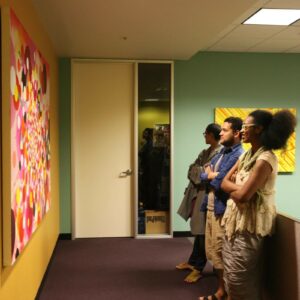
What are some highlights of your time at Walden or of Walden’s impact on your life?
Ofurhe: One of the biggest things about Walden, aside from the musicianship, is the friendships. My two best friends there were Hamilton Sims and Marguerite Ladd. They were the best, and we were pretty inseparable when we were there. We took all our courses together and would spend all our time together. And between summers, we would e-mail and use AOL Instant Messenger. So just like Walden musicianship made me a good musician, I feel like my friendships from Walden made me a good friend. They taught me to navigate friendships across the country. That was really tricky and I think we got pretty good at it, and that’s something that has been really helpful for me.
Rita: With both my kids, Walden helped them have this comfort level with being away from home and cultivated their independence. Anyone I know with a kid who’s like musically inclined, I tell them to check this out. I’m always telling people Walden has been the greatest thing for our family. My kids went to boarding school. They went away to college, and they’re such good travelers. I just can’t say enough good things about Walden to people I encounter, and in fact just the other day I forwarded the info sessions that are coming up to several people. And I’m very fond of Seth and Malcolm. I’ve known them for a long time.
Ofurhe: I remember we helped them stuff envelopes for Walden fundraising appeals.
Why do you give to Walden, and why give a recurring gift?
Ofurhe: We got a lot of financial aid, and I want to be able to pay that forward. I did a lot of academic camps, I just finished a PhD at UC Davis, and so I’ve had a lot of school and I get a lot of alumni giving appeals, and I don’t always pay them much attention. But when Walden comes around, I feel like I need this institution to survive. It was really important to me, and I want other people to have that.
Rita: I just feel so warm and fuzzy about Walden, and I’m a little jealous that I never got to go there. I hope that we will go as a family sometime to experience Walden together. So I just have nothing but fond feelings, and I feel so fortunate that I happened to see that poster at Tupper & Reed, which isn’t even there anymore.
In the Spotlight: Bob Weaver
In the Spotlight
Bob Weaver
Bob Weaver is an alumnus of the Junior Conservatory Camp (JCC), the predecessor program to The Walden School, and has been a participant at Walden’s Creative Musicians Retreat (CMR). Bob and his wife Anne, a fellow JCCer who is a physician as well as an accomplished musician and choral director, are longtime Walden donors and active members of the JCC/Walden alumni community. Bob is Professor Emeritus of Mathematics and Computer Science at Mount Holyoke College. He is a published composer, particularly of hymns and anthems, and an avid choral singer. Bob and Anne live in a retirement community in Needham, Massachusetts.
Bob began attending JCC in 1956. Anne started in 1962, which is when they first met.
How did you first get involved with the Junior Conservatory Camp, and what has been your involvement with JCC and Walden since?
My brother John, a concert organist, composer, and teacher, started as a teenager at the JCC in about 1952. My family and I, from Baltimore, visited camp at Manor Vail in Lyndon Center, Vermont, for a couple of days in summer 1955, and I knew right away that I wanted to be a part of this friendly and supportive community and to study with Mrs. Grace Cushman. So I started there the following summer and continued coming to camp for eight years—right through college. I was on the dishwashing crew and later served as boys’ counselor. Many will remember that the dish crew filled the kitchen with wonderful vocal harmonies and resolving seventh chords while we scraped and loaded the dishwasher.
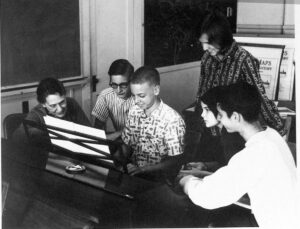
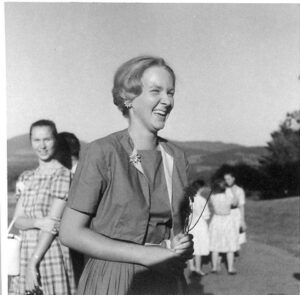
For my last two summers at camp, Anne Conley attended, and we were married when she graduated from Wellesley College in 1967. Later, when we were living in western Massachusetts, we saw an article in our local newspaper, the Greenfield Recorder, announcing a concert to be given by JCCer Nansi Carroll at The Walden School. Not wanting to miss that, we made our first trek up to Dublin, New Hampshire. We were immediately impressed that the warmth and supportive atmosphere that we had known at JCC, years earlier, was most palpably present at Walden in a way that brought back vivid memories of our camp experience. We have since attended all of the JCC/Walden reunions at the Dublin School, and some of the Composers Forums, and we have taken part in fundraising and committee work for the school. Several years ago, I attended the Creative Musicians Retreat (CMR), a week full of inspiring musical events and superb faculty and fellow attendees.
Many JCC folks will remember singing the hymn tunes that I wrote while at camp (“Dear Lord and Father” and “Lord, Thy Glory Fills the Heavens”). Over the years, and especially since I retired from teaching at Mount Holyoke College, I have continued composing and have written a number of other hymn tunes, setting some beautiful texts by my friend, William Pasch, of Atlanta. Together, Bill and I have expanded these tunes into choral anthems and have published with Augsburg Fortress Publishers and the St. James Music Press.
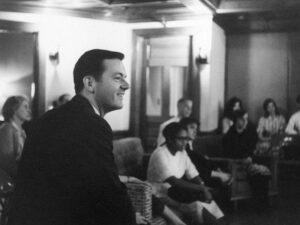
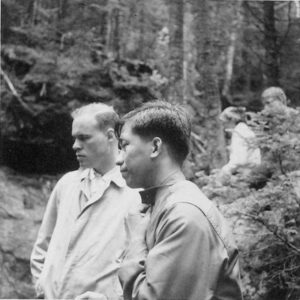
I understand you have a video of JCC that you’d like to share with us. How did the video come together, and what does it show?
In 2007, we attended the JCC/Walden reunion in Dublin. Dr. Ron Nelson, who had been a JCC faculty member and composer-in-residence for a number of years, was unable to be there but made a video to share. It was a silent video with footage from JCC that Ron had taken in 1960. Last spring, I rediscovered the video and worked with Ron to edit it and add some of Ron’s original compositions in the background. You can watch the video here. Ron is now living in Arizona in retirement from the music department of Brown University.
Why do you give to Walden? Do you have any hopes for Walden’s future as we embark on its 50th summer?
Anne and I know how profoundly the Junior Conservatory and Walden have affected and enriched our lives. We contribute to the school in the knowledge that the Walden experience (in both of its forms, YMP and CMR) can have the same positive effect on others who want to learn and compose and share interests. This is a precious program that must be preserved and extended into the future. I urge everyone to give generously to Walden.
Do you have any stories of Walden/JCC connections that you have made and maintained over the years?
So many of the people whom we knew in our summers at JCC have remained our valued friends to this day. We hear of their musical accomplishments, we remain close through email, Zoom, letters, and visits in person. We were so pleased when Walden arranged for a Zoom gathering of JCC alums this past year. That was a real treat that got many of us together for a wonderful virtual sharing of memories.
And here is a “small world” anecdote. At the 2018 Walden reunion at the Dublin School, Anne and I were chatting with a group and mentioned that we are living at the North Hill Retirement Community in Needham, near Boston. Former JCCer Tom Terwilliger said that his mother had lived at North Hill. At that moment, Solon Snider, who was himself a Young Musicians Program alumnus and attending the reunion, overheard us and interjected: “North Hill—my grandparents live there.” It turned out that his grandparents, Stanley (now deceased) and Mary Ann Snider, were fellow residents whom we knew and had visited with over dinner.
Not long ago, I happened to meet a gentleman, Jim Snider, who was reading in one of the lounges at North Hill, and we struck up a conversation. He said that he has a son, Solon, who is very much into music. I immediately recognized that name and said, “I’ve met your son!” He looked puzzled until I said it was at the Walden School! And yes, Jim knew all about Walden and its wonderful programs.
We all have heard that your brother John and his wife Marianne both passed away in 2021. They had a profound effect on the sacred musical scene in this country, and both are remembered for their many years at JCC.
Yes, John graduated from the Curtis Institute and remained a fixture at JCC as a faculty member and as Assistant Director of the camp, except for the years when he was drafted into the Army. For his Army service, he was named the organist and choir director of the Post Chapel at the U.S. Military Academy at West Point. Later, when John’s teacher, Alexander McCurdy, retired from Curtis, John was recruited to replace him in the Organ Department there. Also the organist of the Madison Avenue Presbyterian Church in New York City, he happily commuted to and from Philadelphia by train—his favorite form of transportation. Some years later, the Juilliard School asked him to chair their organ department, which he did while continuing at Curtis for many years until his retirement in 2005.
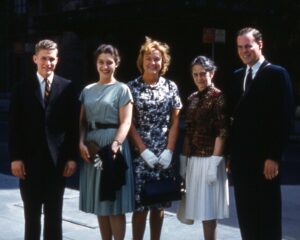
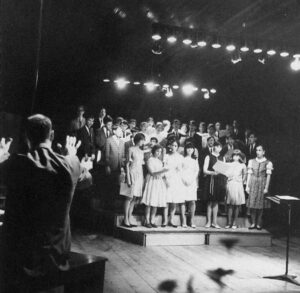
Marianne was a wonderful flutist who performed frequently with John, including at JCC where she was on the staff for many years. She helped lead the music ministry at Madison Avenue, including directing the Junior Choir, and earlier, she and John established the Bach cantata series at Holy Trinity Lutheran Church in New York. John and Marianne spent their summer months at a house that they built in their beloved northern Vermont, not far from Lyndonville, and they eventually retired there.
For more details about John and Marianne, and about my own music, check out my website. There is a link on that site to the JCC/Walden connection. There is also a page that I’ve developed describing John’s career, including videos of John and Marianne in concert in New York and a wonderful 90-minute Public Radio interview (“Pipedreams”) from 2007 in honor of John’s 70th birthday. My contact information is also there, and I’m always happy to hear from people in the JCC and Walden communities.
In the Spotlight: Amy Catlin-Jairazbhoy
In the Spotlight
Amy Catlin-Jairazbhoy
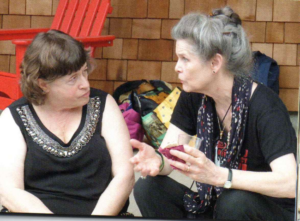
Amy is a Junior Conservatory Camp (JCC) alumna with deep ties to Grace Cushman and her teachings. She is also a donor to Walden who carries herself with a lively and passionate spirit that shines through her research, teaching, music, and everything she does.
Learn more about her work at Apsara Media, and read her full biography on UCLA’s website.
How and when did your relationship with the Junior Conservatory Camp (JCC) begin?
My piano teacher in Montgomery County would take me with her every Saturday to Peabody Preparatory; we would take Musicianship classes with Grace Cushman together. Within two years I was teaching my piano teachers’ students musicianship as well.
This naturally led to attending the Junior Conservatory Camp for two years, then coming three more years as a faculty member.
In my last two years of high school I studied Bharatanatyam classical dance of South India with Georgia Cushman (one of Grace Cushman’s two daughters) in Baltimore. She had just come back from Madras, India (which is Chennai today), where she had studied at Kalakshetra. I was a devoted student, but it’s very difficult when you start at 16 years old! That Indian connection was one reason I went to India as a graduate student. I chose college instead of staying at the Conservatory, because I wanted to know more about the rest of the world, especially during the Vietnam War years.
Could you describe a favorite memory from your time at JCC?
I have an aversion to favorites . . . it seems that you are ranking things. I have many favorite memories. The composer forums were stupendous. The performances were breathtaking. To have my own compositions performed—a Robert Frost poem that I set for piano and violin, performed by soprano Shari Fleming. It was the second time I heard my own composition performed.
Also, singing in some of Humphrey Evans’ compositions. He was a great inspiration and in my cohort of students. He was a close friend until his last days. He was a genius and iconoclastic, funny, witty. We used to play ping pong together at camp!
What is something from JCC that you have carried with you?
How to improvise with the material you’re learning in musicianship. How to make creative use of the knowledge that you acquire was the main teaching that Grace taught all of us. To use what you’ve learned: if you’re just learning facts, you’re not making use of it, and you’re not using it creatively. That’s what I’ve done with my scholarship also. I try to use it in creative ways, applying music research to address community problems, both in India among underserved communities and here (in the US) with refugees from Southeast Asia: Hmong tribal refugees from Laos and Khmer refugees from the killing fields of Cambodia.
It’s so deep. It’s so fundamental, the methods that Grace used—not to mention her enthusiasm and her passion!
Mrs. Cushman taught me how to plan a lesson and how to evaluate a lesson after you’ve taught it. She was very aware of each student’s needs, backgrounds, disabilities, insecurities. I still do that—I plan my lectures; I write out every word when I teach now, and afterwards review every line of what I did and what I added. I keep in touch with as many students as I can; it’s been born into me because of Grace.
How are music and/or creativity part of your life now?
I’ve been teaching one course at UCLA for the past 10 years. It’s not about classical folk music of India, not about music of the sacred (all topics I taught with my applied work in ethnomusicology); it is called “Music of Bollywood and Beyond.” It covers 100 years: from silent films to the present. This history of cinema and music relates deeply to the history and the people of India. I tell my students, most of whom are of Indian heritage, that “you can talk to your grandparents about this.” They come back and say they’ve had the best conversations with their grandparents and parents . . . it bridges the generational gap. Suddenly you have something to share that you both love.
I teach in an applied sort of way. I design the courses myself, and the students are the subjects. We have some great discussions about how films composed 50 years ago might relate to today, about whether they were created before or after independence. It gives it a historical foundation to talk about the films, and the music, and the influence of Western music and jazz.
I also still play the piano. I like to improvise in an Indo-Jazz fusion style which I do sometimes with a partner who plays the saxophone. I’ve taught him how to improvise in different Ragas (singular Indian Raga), especially one raga that my husband called a “hypothetical” raga because it never occurred, but it should have. It uses the pentatonic (all black keys) with C (tonic) and G (dominant).
What is a non-musical hobby that’s part of your life?
Ping pong! It’s a great game for musicians. We have an outdoor ping pong “stadium” in our home. It’s very good for hand-eye coordination. It’s the fastest game there is, good for mental & physical agility. Great for elders, as the sudden movements are good for preventing Alzheimer’s.
I also love to dance: couple dancing, or ballroom dancing and Middle Eastern dance. Coordinating with the music is so important—and so good for the brain. I also exercise at the gym on the elliptical trainer while watching the news. I watch Indian news every day on three different channels.
Why do you give to Walden?
Transformation.
When I went to the Peabody, I was teaching there in my Junior and Senior years of high school. In fact, I had left home.
She [Grace Cushman] made it possible for me to leave by getting me this job as a live-in cook and babysitter for the six children of the Rector of St. Paul’s cathedral. So, I could afford to leave Chicago where my parents had moved, which I hated! I was able stay on in Baltimore after camp.
See what a difference this made in my life? It made me independent from the time I was 16 . . . I didn’t see my parents for two years. I’m telling you: she transformed my life. I owe my life to her. So, when you ask why do I give to Walden? That’s why. The transformation of my life.
What hope do you have for Walden’s future?
I would love to see a connection with NPR’s “From the Top,” and to see more international scope, incorporating music from different cultures!



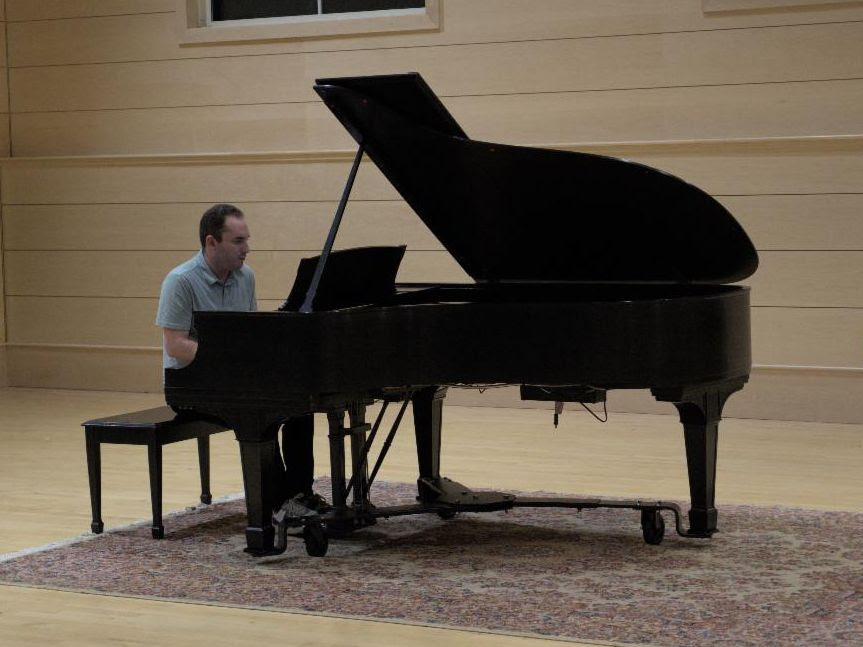
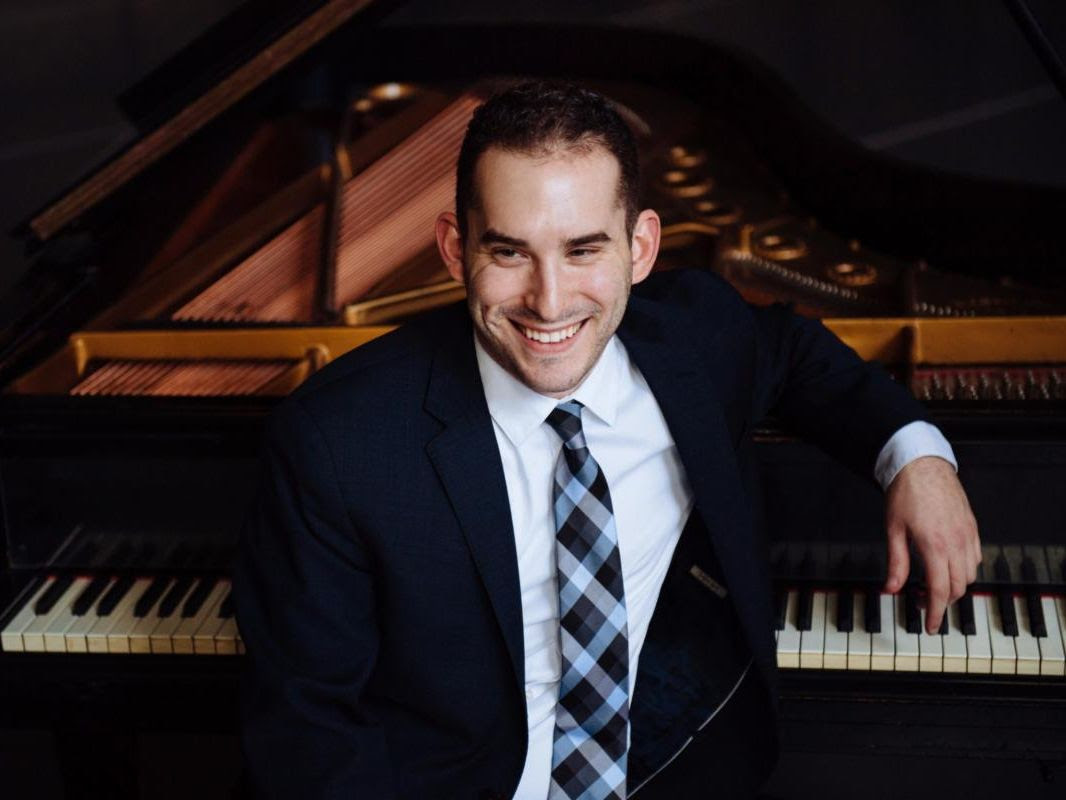 MACKENZIE MELEMED ON WALDEN’S NEW STEINWAY PIANO
MACKENZIE MELEMED ON WALDEN’S NEW STEINWAY PIANO